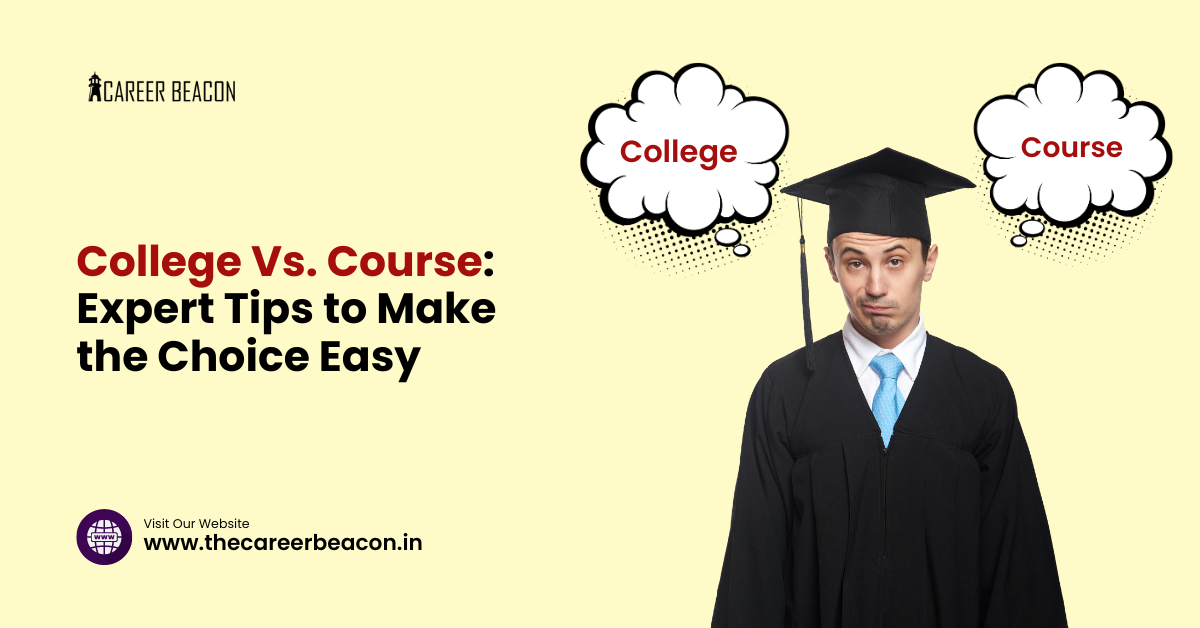
College Vs. Course: Expert Tips to Make the Choice Easy
Choosing the right college to join and the right program of study could be crucial decisions for the majority of students. The first is important, and the second equally as important, but figuring out which is best depends on the individual, the position one wants to have, and the end vision. In this blog, I will endeavour to explain expert career advice for students on how students can differentiate between a college or a course and other essential things students should learn about their careers.
College and Course as Career Determinants
College selection establishes the environment, people, and options you will encounter at that institution; however, the course determines the data and abilities you will acquire. The question that arises is: which is more important?
These two decisions are central to determining the nature of counselling your selected career path would receive. As a question, which one is the best? It all depends on what one values most, whether it is the education quality or the school’s reputation. As seen here, let’s take a look at some of the suggestions from counselling career path experts that can assist in simplifying this decision.
Choosing Your College: What to Consider
Selecting the right college is not a matter of choosing the name of the college. Here are some key factors to consider:
- Reputation and Accreditation: This is the case because the reputation of a college is usually attributed to quality education and faculty. Make sure that the college is accredited because accreditation helps to gain recognition for the degree being earned.
- Facilities and Infrastructure: Does the college have modern facilities that can be identified from other colleges? This covers such areas as laboratories, learning resource centres, sports, and outdoor facilities, among other physical facilities that enhance learning.
- Extracurricular Opportunities: Universities that provide students with a great spectrum of clubs and societies allow for the development of intangible skills such as teamwork, oral communication, and leadership. These are so important when it comes to matters concerning your career.
- Networking and Alumni Connections: Alumni mean well as they can offer guidance and secure internships and jobs for internships as well as employment placements. Some aspects of a college that should be looked at include how integrated the college is with industries of relevance.
Why Your Course Choice Is Way More Important Than You Realise
Though college is important, the type of course you undertake will be even more important for your employment. Choosing the right course can determine the right track for your career. Here’s why course selection is critical:
- Job Market Demand: Not all specialised fields are as popular as the others are. Ensure that the course you take is relevant to today’s requirements and conditions for job security in the future.
- Passion and Interest: Avoid following the trend or choosing a program that friends encourage you to choose. Always go for something that catches your interest, because lack of interest kills your motivation.
- Skill Development: The skills that you will be imparted by a well-structured course ensure that one is well positioned to make the right career decision in the area of specialization. Make sure that the course comprises such elements as internships, projects, or field studies.
Guidelines Offered by the Experts to Enable Anyone to Choose Between College and Course
Here are some practical tips to simplify your decision-making process:
- Evaluate Your Career Goals: The starting point is the identification of your career aspirations over the long term. Do you plan to move to a narrow speciality in which the curriculum has a decisive significance? If so, make the course come before the college. For instance, if your end goal is to become a software developer, it might be worth it to select a course in programming rather than a reputable college or university.
- Seek Professional Career Advice for Students: Career counsellors are qualified personnel who should enlighten a client on the right course or college to join depending on his or her strengths, areas of interest, as well as overall career goals. The Professional guidance for learners is highly relevant when making such crucial decisions.
- Consider Flexibility in Course Choices: Some colleges may give the flexibility of having different academic options like a double major or minor that can guide you in any direction you fancy. If the graduate is not sure about the course to pursue, then this flexibility could be more important than the college brand.
- Balance Reputation and Curriculum: To get some perspective, think this way: If you discover that there is no revered college that offers the course you love or the syllabus is stagnant, then in this case the course should come first. But, of course, if both the college and the course are good, then we have a perfect match.
Counselling Your Career Path: The Choices Between College and Course
Among the most frequently asked questions during career counselling is where the emphasis should be put—on the college or the course. Here’s a breakdown of when to prioritise each:
- When to prioritise college: You’re Aiming for a Prestigious Brand: If going to the top-rated scholarly institution will positively tamper with your employment opportunities, then it may be advisable to choose the right college.
- Strong Networking Opportunities: Certain colleges are well endowed with clear links to alumni networks, internships, and placements adequate to enhance your career.
- Specialised Faculty and Research: If the college, for example, is famous for conducting research in your area of discipline, this would be very beneficial to you.
When to Prioritise Course:
- Industry-Specific Skills Matter: If you are preparing for a job that requires certain trades, for example, the medical field, engineering, IT, or any area that requires skills in handling sophisticated data, the course should be the ultimate focus.
- Future Job Market Trends: About the current shifts in the job market, particular interest in a course that prepares individuals for future job demands can provide greater job security.
- Personal Passion and Interest: There is every likelihood that if you choose a course that you are interested in, you will attain better results and be happier in your job.
Conclusion: Making the Right Choice
Still, it is not an easy task when deciding between college and a course; however, the assessment of the priorities, interests, and general counselling career path objectives can greatly help. Controversy as to whether college or course is more important depends on one’s desires and goals as per the counselling profession.
Students should seek career advice to navigate this decision, as it will determine early success in their career. The college and course you choose are important, but passion, dedication, and the skills you gain will shape your career path.


